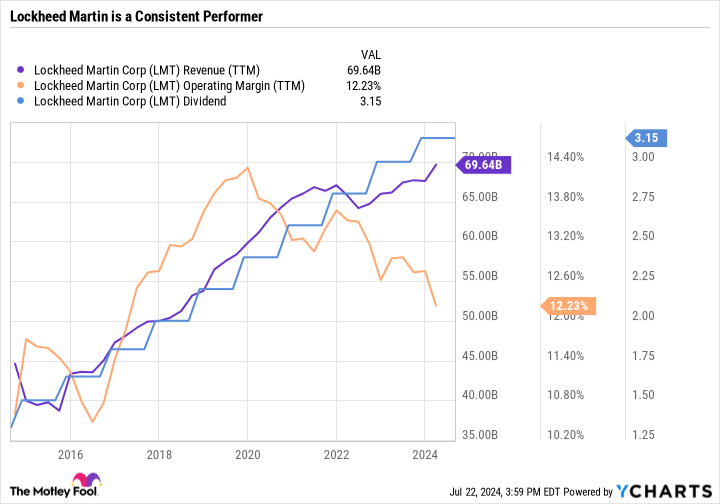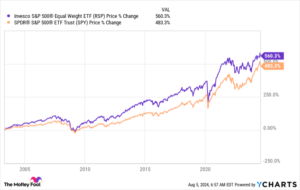5 Dividend Stocks to Buy Even if You Are Worried About a Stock Market Sell-Off

Buying stocks if you’re worried about a stock market sell-off sounds counterintuitive. After all, why put your hard-earned money into something if it will lose value?
Historically, investing during corrections (drawdowns of at least 10%) and bear markets (drawdowns of at least 20%) has been a winning decision. Companies that pay dividends provide an added incentive to endure periods of heightened volatility.
Here’s why Coca-Cola (NYSE: KO), Lockheed Martin (NYSE: LMT), Waste Management (NYSE: WM), Union Pacific (NYSE: UNP), and United Parcel Service (NYSE: UPS) are five companies that are built to last and can reward investors with passive income no matter what the overall stock market is doing.

1. Coca-Cola
Coca-Cola is close to a flawless dividend stock. It has paid and raised its dividend for 62 consecutive years, making it a Dividend King. It also has a sizable yield at 3%, considerably higher than the S&P 500‘s yield of 1.3%, or 1.7% for the Dow Jones Industrial Average.
Most importantly, it has a recession-resistant business model. Its portfolio comprises soft drinks, coffee, tea, juice, sparking water, and energy drinks — all relatively low-cost staples. Consumer behavior varies, but in general these are the types of products that enjoy steady demand no matter what the economy is doing.
Coke has been a market-underperforming stock for years, but there is reason to believe it is turning the corner and could accelerate its earnings growth. That turnaround could take time, although an attractive dividend adds a worthwhile incentive to be patient and let an investment thesis play out.
It’s one of the reasons Warren Buffett-led Berkshire Hathaway (NYSE: BRK.A) (NYSE: BRK.B) has held the stock for over 30 years and why Coke remains a great buy now.
2. Lockheed Martin
Lockheed Martin operates in a completely different industry than Coke, but the defense contractor has a similar investment proposition.
It does virtually all of its business with the U.S. government and, to a lesser extent, with approved U.S. allies. A reliable customer base and a massive backlog make Lockheed’s cash flows predictable, which helps with budgeting expenses and dividend payments.
The following chart sums up the business well: steady sales growth, a range-bound operating margin in the low to mid double percentages, and annual dividend raises. It has increased its payout for 21 consecutive years and currently yields 2.5%.
The stodgy nature of the defense industry typically results in discounted valuations, even for the top players. Sure enough, Lockheed’s price-to-earnings (P/E) ratio is just 17.4, which is close to the 10-year median P/E of 17.8.
Add it all up, and Lockheed is an ultra-reliable dividend-paying value stock that can do perfectly fine no matter what the market is doing.
3. Waste Management
Unlike many dividend stacks that have lagged behind the growth-stock-fueled rally, WM (as Waste Management refers to itself) has been a strong performer and is hovering around an all-time high.
The company’s business model is beautifully simple. WM collects, transports, and processes trash and recycling materials for residential, commercial, and industrial customers. It also invests in lower-carbon efforts, such as converting landfill gas that forms from the decomposition of organic matter in landfills into pipeline-quality natural gas.
WM tends to do better in periods of expansion as industrial and commercial consumers produce more goods and, therefore, have more waste. But it should still be considered a recession-resistant business because cash flows are largely based on long-term contracts, and there’s a need for its services regardless of the economy.
For example, WM has switched most of its recycling business to fee-for-service, which helps protect against changes in commodity prices.
The biggest downside is the stock’s valuation. It has more than doubled over the last four years, while the dividend is up less than 40%. Anytime a stock’s price outpaces the dividend growth, the yield will come down, which is why WM now yields just 1.4%.
Even by estimated earnings, WM is a pricey stock, with a forward P/E of 30.5. However, it will likely be just fine if there is an economic slowdown and a stock market sell-off. It’s a company you can count on to endure volatility, but only if you’re OK with the premium valuation.
4. Union Pacific
Union Pacific is one of the largest railroads in North America. Focusing on the western two-thirds of the U.S., the high-margin cash cow is instrumental in transporting goods at low cost.
Although railroad stocks are considered cyclical, the industry is essentially an oligopoly, given its high barriers to entry and capital-intensive nature. But it’s not an oligopoly in the same way that FedEx and UPS are, or Coke and PepsiCo, because there’s no direct competition among all the railroads. For example, CSX and Norfolk Southern focus mainly on the eastern third of the U.S.
The closest competitor to Union Pacific is Berkshire Hathaway’s BNSF, but even then, railroads operate different networks and don’t serve the exact same regions.
Another advantage of railroads is that they own their infrastructure, so expenses are mainly going toward labor and upkeep rather than building entirely new routes.
Union Pacific might see a slowdown during an economic downturn, but you can rest easy knowing the business model is built for the long term. It has a reasonable 23.3 P/E and raised its quarterly dividend to $1.34 per share earlier this month, representing a forward yield of 2.2%.
5. UPS
UPS hit a new 52-week low after reporting disappointing results. Package delivery volumes are down, and costs are up. That has taken a sledgehammer to the company’s growth trajectory and wiped away the momentum it enjoyed in the earlier part of the pandemic.
UPS reset expectations during its 2024 Investor and Analyst Day, charting a path toward achievable three-year targets. The stock has gone essentially nowhere since that presentation in March, and it wouldn’t be surprising if it continued to languish in the short term. But in the long term, the business is simply too good to ignore.
Management is investing heavily in improvements and innovations, including artificial intelligence, to help drive margin growth. It is boosting its healthcare services to target a specific customer base with time- and temperature-sensitive shipments.
With a mere 21 P/E and a whopping 5.1% yield, UPS stands out as a worthwhile buy-and-hold candidate for investors looking to jolt their passive income streams even if there’s a stock market sell-off.
Rock-solid stocks to buy now
When considering a stock market sell-off, investors might gravitate solely toward ultra-safe choices like Coke, Lockheed Martin, or WM. All three businesses are certainly worth investing in, but cyclical companies with inexpensive valuations and growing dividends — like Union Pacific and UPS — can also be good buys.
The most important quality to look for when investing is a company’s ability to deliver on shareholder expectations well into the future. For dividend-paying companies, that means growing earnings to support higher dividend growth, maintaining a competitive edge, and cultivating a strong balance sheet. In sum, all five of these companies are industry-leading businesses that are well positioned to endure a downturn or even take market share and emerge stronger.
Should you invest $1,000 in Coca-Cola right now?
Before you buy stock in Coca-Cola, consider this:
The Motley Fool Stock Advisor analyst team just identified what they believe are the 10 best stocks for investors to buy now… and Coca-Cola wasn’t one of them. The 10 stocks that made the cut could produce monster returns in the coming years.
Consider when Nvidia made this list on April 15, 2005… if you invested $1,000 at the time of our recommendation, you’d have $692,784!*
Stock Advisor provides investors with an easy-to-follow blueprint for success, including guidance on building a portfolio, regular updates from analysts, and two new stock picks each month. The Stock Advisor service has more than quadrupled the return of S&P 500 since 2002*.
*Stock Advisor returns as of July 22, 2024
Daniel Foelber has no position in any of the stocks mentioned. The Motley Fool has positions in and recommends Berkshire Hathaway, FedEx, and Union Pacific. The Motley Fool recommends Lockheed Martin, United Parcel Service, and Waste Management. The Motley Fool has a disclosure policy.
5 Dividend Stocks to Buy Even if You Are Worried About a Stock Market Sell-Off was originally published by The Motley Fool








